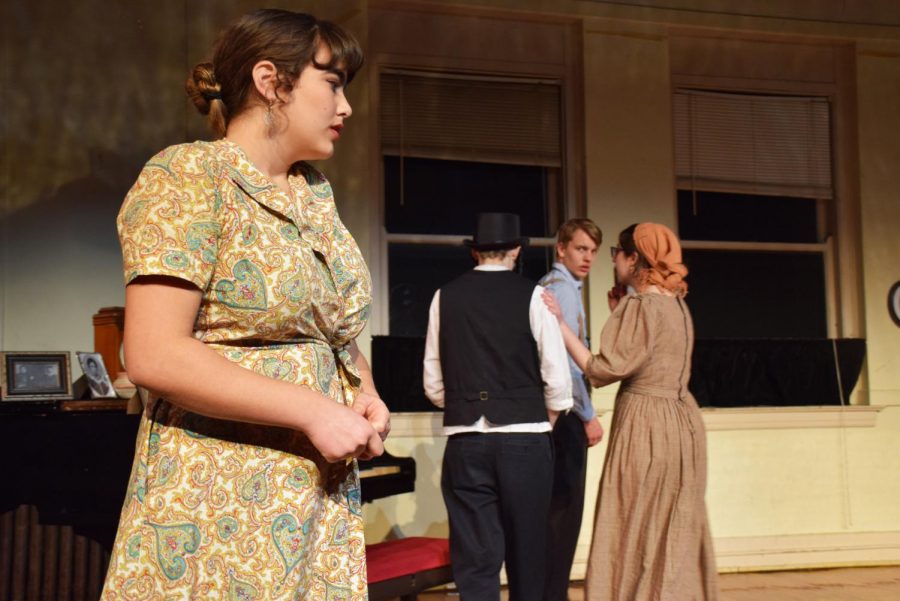Student-Written OSTA Play Discusses Yiddish Culture
The cast of A Nacht A Sheyne, in rehearsal for their show. The production runs Thursday, Feb. 14 to Saturday, Feb. 16 in Wilder Main Space.
Dressed in their 1920s best, Oberlin Student Theater Association actors took the stage last night for the opening performance of College senior Claire Abramovitz’s original period piece play A Nacht A Sheyne. The Yiddish-inspired dramatic comedy explores the generational tension between traditionally minded parents and their assimilationist children as both groups attempt to navigate early 20th-century America.
A Nacht A Sheyne revolves around a night in the Resnik family home and is filled with all the uncomfortable dynamics of an awkward Thanksgiving dinner. The Resniks — father Elya, played by College senior Teague Harvey; mother Golda, played by College sophomore Noa Segal; and daughter Sarah, played by College sophomore Gina Fontanesi — are a Jewish family who have recently immigrated to the United States from Eastern Europe. But while Elya and Golda remain tied to their traditions, Sarah has embraced all that America has to offer.
This underlying discrepancy comes to a head when Sarah falls in love with Leo Allen, an assimilated Jewish man played by College first-year Cyrus Thelin, only to find out that her parents have arranged for her to marry the more traditional Lazer Horovitz, played by College sophomore Liam Ashbrook. Both suitors come to dinner, and much yelling ensues.
For Abramowitz, this week’s production represents the culmination of years of work and revision.
“I started writing the play my sophomore year, Winter Term 2017, but I had the idea for the play my spring semester [first] year,” she said.
Abramovitz was inspired to write about the topic after studying Yiddish culture at Oberlin.
“When I was in a course on modern Yiddish culture, I was reading a lot of Yiddish theater,” she said. “A lot of the themes really struck a chord with me, and I thought I could do this and I should do this.”
The influence of Yiddish theater on the play is apparent, and Abramovitz points out that the play even derives its name from a previous Yiddish work.
“The title is called A Nacht A Sheyne, which means ‘a beautiful night’ in Yiddish,” she said. “I was flipping through [a book of Yiddish songs] one night, looking for a title … and I found a song that was called ‘Oy a Nacht a Shayna,’ which means ‘Oh, a beautiful night’ … I was reading the lyrics and I was like, ‘These speak to me.’ I think they speak to the play. And also it’s a little ironic, because the night’s a disaster.”
At its core, A Nacht A Sheyne is a story about the opportunities and costs of cultural assimilation. In addition to analyzing a crucial time in American Yiddish culture, A Nacht A Sheyne aims to contribute to the ongoing revival of Yiddish culture.
Although the play focuses on the specific cultural questions that Ashkenazi Jews faced in early 20th-century New York, College junior and director Abigail Bowman thinks the underlying themes are universally relatable.
“There’s one moment in the second act where the mother character has a bit of a moment, and it’s a moment that I’ve seen my grandmother have directly towards me so many times that when I was reading it, I was just like, ‘Oh my god, so relatable,’” Bowman said. “It’s such a Jewish play … [but] I think any student will be able to relate to it.”
Abramovitz agrees.
“I think the universal theme of your parents telling you one thing and your being like, ‘Oh my God, please let me do another’ is [very relatable],” she said. “I’d be hard-pressed to find anyone who wouldn’t relate to that.”
Segal also feels that the play’s characters are relatable and timeless.
“I find that my character reminds me a lot of my own grandmother, and it’s been interesting thinking about my own family dynamics in relation to this play,” they said. “Although my family is obviously not a Jewish family in 1913 New York … I find that I relate a lot to my character in that she really wants the best for her daughter, but she isn’t really able to see that what’s best for her daughter is what [her daughter] wants or what she wanted initially.”
A Nacht A Sheyne opened Thursday, Feb. 14 and will run Friday and Saturday night at 8 p.m. All shows are in Wilder Main and free to the public.











